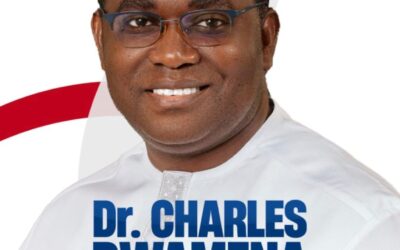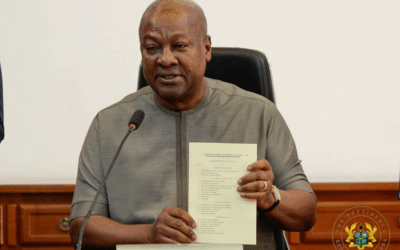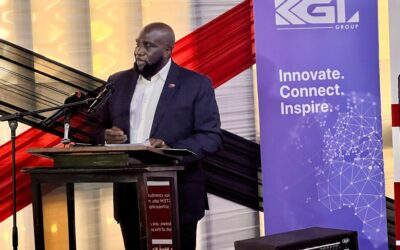13TH AUGUST, 2025.
PROFESSOR AHMED JINAPOR ABDULAI
(DIRECTOR GENERAL)
GHANA TERTIARY EDUCATION COMMISSION (GTEC)
PO BOX MB28, ACCRA
EAST LEGON -TRINITY -IPS ROAD.
Dear Sir,
RE: RESPONSE TO CORRESPONDENCE CONCERNING HONOURABLE DR GRACE AYENSU DANQUAH


We act as solicitors for Honourable Dr. Grace Ayensu Danquah and write in response to your recent letters regarding your purported assessment of her academic and professional credentials.
Our client is deeply displeased, not only by the conclusions you have reached, but by the manner in which your letters have been framed. The tone adopted has been abrasive, unnecessarily combative, and in parts, disparaging. The communications, in our respectful view, fall short of the standards of professionalism, impartiality, and courtesy that should characterise the actions of a statutory administrative body established under the Education Regulatory Bodies Act, 2020 (Act 1023).
We note with concern the absence of any reference to defined criteria, published guidelines, or formal standards by which her credentials were assessed. The assessment appears to have been carried out without transparency, and without clear indication of the statutory or regulatory framework relied upon. This lack of procedural clarity raises legitimate apprehension that the process was unguided and influenced by subjective or extraneous considerations.
Most troublingly, your letters have been copied to officials in Parliament and even at the Presidency, creating the impression of misconduct in connection with her tenure as a Parliamentarian and Deputy Minister. These are elective and appointive offices respectively, not positions to which she applied using her academic credentials as the basis for eligibility. It is therefore wholly improper, and potentially defamatory, to circulate such correspondence in a manner that conflates her political service with an unproven dispute over academic titles. This impropriety is further compounded by the fact that your most recent letter was addressed directly to the Chief of Staff rather than to our client, a step that is both procedurally irregular and suggestive of an attempt to escalate a matter of academic interpretation into a political controversy.

Given the posture the Commission has adopted to date, we would not be surprised if you further to place the contents of your correspondence in the public domain, as your actions thus far suggest a greater interest in publicity and theatre than in quiet rigour, fairness, and adherence to statutory mandate.
We also note with dismay the insinuation, whether by direct statement or innuendo, that our client may have used unearned or improperly obtained credentials to secure employment or commit fraud. Such allegations are grave, and in the absence of proven fact and due process, they are prejudicial to her reputation and contrary to the principles of administrative fairness.
Further, there is absolutely no legal or professional prohibition against our client addressing herself as “Professor,” particularly as this is consistent with her recognised academic title in the United States. Your correspondence appears to proceed on a fundamental misunderstanding of the distinction between tenure-track and non-tenure-track faculty positions. The Commission’s apparent view that only tenure-track status entitles an academic to be addressed as “Professor” is erroneous, inconsistent with international academic practice, and an overreach of your mandate. In the United States, from which our client’s title derives, both tenure-track and non-tenure-track appointments may confer the title “Professor,” and your misinterpretation on this point cannot lawfully diminish her right to be addressed accordingly.
In accordance with the duties of your office under sections 2, 3, 4, 7, and 8 of Act 1023, and the requirements of procedural fairness inherent in Ghanaian administrative law, we require that the Commission:
Disclose in full the process followed in arriving at your conclusions, including the specific standards, benchmarks, and legal or regulatory provisions relied upon;
Identify the statutory or regulatory basis upon which you have assumed jurisdiction to assess the credentials of an individual who is not a current administrator or employee of a tertiary education institution;
Clarify the internal and statutory mechanisms for appeal or redress available to persons aggrieved by your determinations, including timelines, procedural requirements, and the forum of appeal;
Set out your interpretation of your mandate under Act 1023 in relation to the verification of credentials of persons outside tertiary education institutions, including whether such an interpretation has been publicly consulted upon or published; and
Provide evidence that our client was afforded the due and well outlined opportunity to be heard and to make representations before your findings and the impugned correspondences were issued.
Section 7 of Act 1023 restricts the Commission’s regulatory functions to the implementation of approved regulations and standards with respect to tertiary education institutions and to the verification of the authenticity of certificates, diplomas and degrees upon request. Section 8 further provides that the recognition and determination of equivalencies of degrees must be conducted “in accordance with the standards and guidelines set by the Commission.”
First, at no point has our client requested that GTEC verify her academic certificates, diplomas, or degrees. Nor has the Commission at any time formally requested to review or verify those qualifications. Had such a request been made, and had the Commission confined itself to that statutory remit, it would have confirmed without difficulty that our client holds academic qualifications from institutions of the highest international repute.
Instead, the Commission appears to have embarked upon an entirely separate and unauthorised line of inquiry, focusing not on the authenticity of her qualifications but on her use of an academic title. This is a matter wholly outside the statutory scope of your verification powers. Rather than acknowledging that a respected academic institution has, in fact, appointed her to a position which confers that title, the Commission elected to issue dismissive and conclusory statements suggesting that she was “no more than a part-time lecturer.” This is an extremely unwarranted and unfounded conclusion, unsupported by any objective assessment or evidence.
Moreover, the Commission has no established processes, guidelines, or comparative frameworks for distinguishing and interpreting academic titles across different countries and jurisdictions. Without such tools, there is no objective or lawful basis upon which to discount or reclassify an academic appointment made by a recognised institution.
The Commission has provided no evidence of any criteria or methodology that could competently differentiate, for example, a Maître de conférences from a Reader, a Professor of Surgery from a Clinical Professor, or a Professeur agrégé (PRAG) from a Professeur certifié. In the absence of such a framework, any attempt to redefine or diminish a foreign-conferred title is speculative, subjective, and ultra vires.
The approach taken here – reacting to media commentary, and apparently even relying on Facebook monikers – is not reflective of an institution exercising its mandate with academic integrity, scholarly rigour, or institutional modesty. It gives the appearance of an ad hoc, slightly vindictive and personality-driven exercise, rather than one grounded in law, evidence, and internationally recognised academic norms. Such an approach cannot withstand scrutiny, whether in the forum of public administration or before the courts.
Internationally, the recognition and use of academic titles is governed by established comparative frameworks, not by ad hoc national reinterpretation. Instruments such as the UNESCO Global Convention on the Recognition of Qualifications concerning Higher Education (2019) and the Lisbon Recognition Convention require that national bodies respect the formal appointments and titles conferred by recognised institutions abroad, unless substantial differences can be demonstrated.
Similarly, within the European Higher Education Area under the Bologna Process, distinctions between professorial ranks (including Maître de conférences, Reader, Professor, Clinical Professor, and Professeur agrégé) are understood in their national contexts and not redefined by foreign regulators without expert comparative review. In the United States, faculty appointment policies at accredited universities confirm that both tenure-track and non-tenure-track appointments may carry the title “Professor” without distinction in form of address. These frameworks emphasise that recognition decisions must be evidence-based, grounded in comparative academic norms, and made with deference to the appointing institution – none of which appears to have guided the Commission’s approach in this matter.
While it is acknowledged that these international instruments such as the UNESCO Global Convention on the Recognition of Qualifications concerning Higher Education (2019) and the Lisbon Recognition Convention focus primarily on the recognition of academic qualifications (degrees, diplomas, and certificates), their underlying principles are directly relevant by analogy to academic titles.
Where a recognised higher education institution confers both a qualification and a formal academic appointment, the professional title attached to that appointment is an inseparable incident of the credential and the role. Recognition frameworks require that the qualification and its associated academic status be respected in their country of origin unless substantial differences are objectively demonstrated through a transparent and documented process. By seeking to reinterpret or diminish the professorial title conferred by a reputable foreign institution – without any comparative framework or expert basis – the Commission departs from these internationally accepted norms and substitutes personal conjecture for evidence-based evaluation.
It is also noteworthy that the principles of good administration require that statutory bodies act with due courtesy, avoid emotive or accusatory language in official correspondence, and maintain neutrality in the absence of proven misconduct. The accusatory tone of your correspondence, the circulation of these letters to political offices unconnected to the matter, and the confusion over basic academic norms give rise to the appearance of bias and undermine public confidence in the Commission’s work.
We must therefore register our strong disagreement with your conclusions and characterisation of our client’s credentials. Until you have provided the information requested above, the basis and propriety of your assessment remain in serious doubt.
For completeness, we note that we are copying this correspondence to the various individuals and offices to whom your prior letters were circulated, including officials in Parliament and at the Presidency. We do so not because we consider such dissemination to have been appropriate, but because those parties have now been unnecessarily drawn into the matter by the Commission’s own actions. In particular, your most recent letter was addressed directly to the Chief of Staff rather than to our client, an approach that is highly irregular and inconsistent with the principles of direct engagement and procedural fairness. Having involved such high-level offices in an issue that should have been addressed with our client in a professional and discreet manner, it is now necessary that they are fully apprised of the concerns raised herein.
Finally, we request that you respond to this letter within fourteen (14) days of receipt, with full disclosure of the documents, processes, and legal provisions relied upon, failing which our client reserves all her rights to seek appropriate remedies including orders of certiorari and mandamus, as well as declaratory relief to protect her reputation and professional standing.
We trust that this matter will receive your urgent attention and that the Commission will take steps to realign its approach to ensure that its actions remain within the confines of the law and the principles of fair administrative justice.
Yours faithfully,
…………………..
DAVID K. AMETEFE, ESQ.
CC : 1. CHIEF OF STAFF, OFFICE OF THE PRESIDENT,
REPUBLIC OF GHANA
- HON. MINISTER OF HEALTH, ACCRA
- CLERK OF PARLIAMENT
- CHAIRMAN, GTEC BOARD
- oHON. DR. GRACE l DANQUAH (MP).

















